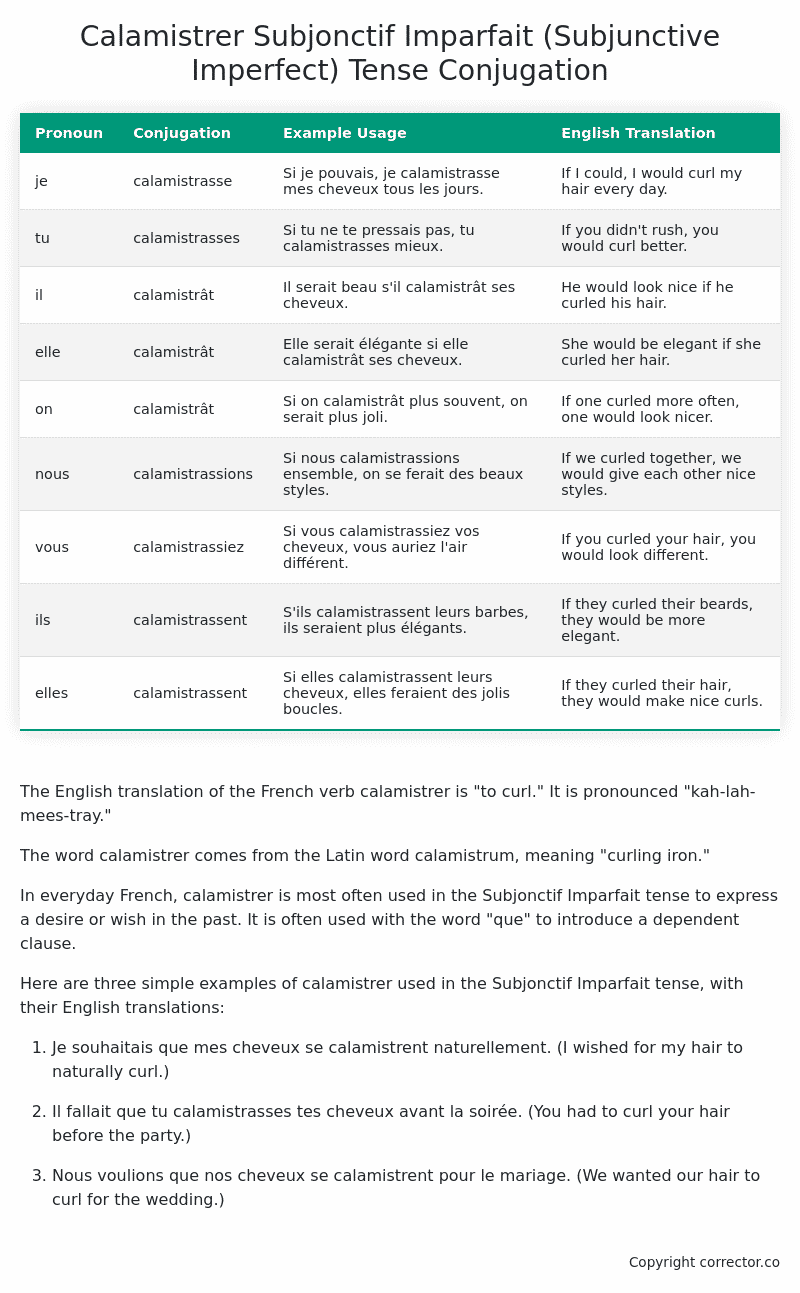Subjonctif Imparfait (Subjunctive Imperfect) Tense Conjugation of the French Verb calamistrer
Introduction to the verb calamistrer
The English translation of the French verb calamistrer is “to curl.” It is pronounced “kah-lah-mees-tray.”
The word calamistrer comes from the Latin word calamistrum, meaning “curling iron.”
In everyday French, calamistrer is most often used in the Subjonctif Imparfait tense to express a desire or wish in the past. It is often used with the word “que” to introduce a dependent clause.
Here are three simple examples of calamistrer used in the Subjonctif Imparfait tense, with their English translations:
-
Je souhaitais que mes cheveux se calamistrent naturellement. (I wished for my hair to naturally curl.)
-
Il fallait que tu calamistrasses tes cheveux avant la soirée. (You had to curl your hair before the party.)
-
Nous voulions que nos cheveux se calamistrent pour le mariage. (We wanted our hair to curl for the wedding.)
Table of the Subjonctif Imparfait (Subjunctive Imperfect) Tense Conjugation of calamistrer
| Pronoun | Conjugation | Example Usage | English Translation |
|---|---|---|---|
| je | calamistrasse | Si je pouvais, je calamistrasse mes cheveux tous les jours. | If I could, I would curl my hair every day. |
| tu | calamistrasses | Si tu ne te pressais pas, tu calamistrasses mieux. | If you didn’t rush, you would curl better. |
| il | calamistrât | Il serait beau s’il calamistrât ses cheveux. | He would look nice if he curled his hair. |
| elle | calamistrât | Elle serait élégante si elle calamistrât ses cheveux. | She would be elegant if she curled her hair. |
| on | calamistrât | Si on calamistrât plus souvent, on serait plus joli. | If one curled more often, one would look nicer. |
| nous | calamistrassions | Si nous calamistrassions ensemble, on se ferait des beaux styles. | If we curled together, we would give each other nice styles. |
| vous | calamistrassiez | Si vous calamistrassiez vos cheveux, vous auriez l’air différent. | If you curled your hair, you would look different. |
| ils | calamistrassent | S’ils calamistrassent leurs barbes, ils seraient plus élégants. | If they curled their beards, they would be more elegant. |
| elles | calamistrassent | Si elles calamistrassent leurs cheveux, elles feraient des jolis boucles. | If they curled their hair, they would make nice curls. |
Other Conjugations for Calamistrer.
Le Present (Present Tense) Conjugation of the French Verb calamistrer
Imparfait (Imperfect) Tense Conjugation of the French Verb calamistrer
Passé Simple (Simple Past) Tense Conjugation of the French Verb calamistrer
Passé Composé (Present Perfect) Tense Conjugation of the French Verb calamistrer
Futur Simple (Simple Future) Tense Conjugation of the French Verb calamistrer
Futur Proche (Near Future) Tense Conjugation of the French Verb calamistrer
Plus-que-parfait (Pluperfect) Tense Conjugation of the French Verb calamistrer
Passé Antérieur (Past Anterior) Tense Conjugation of the French Verb calamistrer
Futur Antérieur (Future Anterior) Tense Conjugation of the French Verb calamistrer
Subjonctif Présent (Subjunctive Present) Tense Conjugation of the French Verb calamistrer
Subjonctif Passé (Subjunctive Past) Tense Conjugation of the French Verb calamistrer
Subjonctif Imparfait (Subjunctive Imperfect) Tense Conjugation of the French Verb calamistrer (this article)
Conditionnel Présent (Conditional Present) Tense Conjugation of the French Verb calamistrer
Conditionnel Passé (Conditional Past) Tense Conjugation of the French Verb calamistrer
L’impératif Présent (Imperative Present) Tense Conjugation of the French Verb calamistrer
L’infinitif Présent (Infinitive Present) Tense Conjugation of the French Verb calamistrer
Struggling with French verbs or the language in general? Why not use our free French Grammar Checker – no registration required!
Get a FREE Download Study Sheet of this Conjugation 🔥
Simply right click the image below, click “save image” and get your free reference for the calamistrer Subjonctif Imparfait tense conjugation!

Calamistrer – About the French Subjonctif Imparfait (Subjunctive Imperfect) Tense
Formation
Common Everyday Usage Patterns
Interactions with Other Tenses
Subjonctif Présent
Indicatif Passé Composé
Conditional
Conditional Perfect
Summary
I hope you enjoyed this article on the verb calamistrer. Still in a learning mood? Check out another TOTALLY random French verb conjugation!


